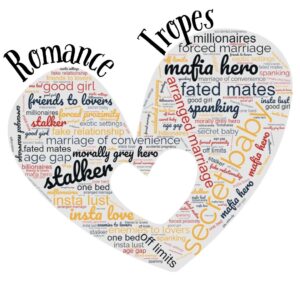 Like it, or hate it…tropes sell books. Every fiction popular genre has them, as do some of the nonfiction genres. Even literary fiction has popular tropes, though they are rarely referred to as such. 😉
Like it, or hate it…tropes sell books. Every fiction popular genre has them, as do some of the nonfiction genres. Even literary fiction has popular tropes, though they are rarely referred to as such. 😉
But inserting a trope for marketing value can ruin the underlying story.
It can also enhance it.
We’ve all read the books where certain tropes are included but they don’t fit the characters or the story. Instead of adding a layer of enjoyment for the readers who love that trope, it makes it a less compelling read for everyone.
I call this Franken-troping: splicing in a trope that is not part of the story and it shows. Just like the stitches on Frankenstein’s monster, the trope sticks out in an otherwise compelling storyline.
The trope I’ve noticed used most frequently this way? Spanking. It probably sticks out to me because it’s not my favorite. But let’s be real. Inserting this popular trope in a dark romance helps a lot of authors sell books. Doing it poorly will have an author falling off of auto-buy lists though.
How do we do it well then?
If you’re looking to include (or insert) a trope into your story, look for ways to not only make it fit your story, but enhance it. Motivate the trope with more than a throwaway line or sparsely developed subplot. Motivate with believable backstory and current events. Whether the inclusion of the trope is organic, or planned, it needs to feel organic to the story.
Here’s an example for another trope that readers either love, or hate. That’s the pregnancy trope. In RUTHLESS ENFORCER, Atlas knows two things pretty much from the beginning: he wants to keep Lucia in his life and he’s lying to her, so that might be hard to do.
His answer in typical alpha male fashion is not to just tell her the truth. He’s pretty sure it’s too late for that anyway. But when he learns she wants a kid enough to maybe try a sperm donor, he jumps on it like a man who doesn’t need a parachute…or a bungee cord. He does his best to get her preggers and they both have a lot of fun along the way.
Do you see how the trope feeds the storyline though? Both Lucia and Atlas’s reasons for even considering the pregnancy thing lie within the characters. Their own feelings, dreams and limitations drive this element to the story.
I’ll be honest, it wasn’t something I included because I was looking for tropes to beef up the marketability of my book. From the beginning, I knew that this would be part of my story.
Looking for ways to include tropes isn’t how I develop story. I write a story I want to read and spend time with for weeks or months. Popular tropes are naturally part of those stories because I like reading them too, so my creative brain uses them in the fodder of story inspiration.
However, that’s me and it doesn’t mean that you can’t insert tropes purposefully and effectively.
Back to the spanking trope. I read several authors who use it. Some have stayed on my auto-buy list. Some have fallen off. Two have even moved to my do-not-buy-again list. Why? Because in their effort to meet reader expectation, they created scenes in their books that are neither well motivated, nor true to the characters.
Have other readers enjoyed those books? Reviews say yes. So, you know, as in all things, this is just my opinion. 😊
But what happens when the popularity of that trope starts to wane? My gut tells me those authors will keep diehard readers and others will move on to new authors. Because if other readers have felt any of that dissonance, they won’t necessarily know why, but those authors’ books will no longer resonate with them.
I’ve been in publishing a long time, you all. I’ve seen entire subgenres nearly disappear from bookstore shelves when their popularity waned and dozens of authors lose their publishers and/or readers when that happened. Tropes go in and out of popularity too.
If you are going to write to market, you need to stay abreast of what is most popular in the market you want to write for. And if you write consistently well developed stories, a big chunk of your readers will follow you when the tropes you write change. Or even the genre.
Happy writing!







